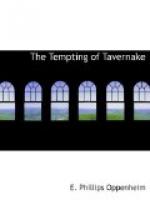“I don’t understand,” Tavernake protested. “I thought the young lady was ill.”
“She may be ill or she may not,” the man replied, sulkily. “All I know is that they couldn’t pay their rent, couldn’t pay their food bill, couldn’t pay for the drinks the old man was always sending out for. So tonight I spoke up and they’ve gone.”
“At least you know where to!” Tavernake exclaimed.
“I ain’t no sort of an idea,” the man declared. “Take my word for it straight, guvnor, I know no more about where they went to than the man in the moon, except that I’m well shut of them, and there’s a matter of eighteen and sixpence, if you care to pay it.”
“I’ll give you a sovereign,” Tavernake promised, “if you will tell me where they are now.”
“What’s the good of making silly conditions like that!” the man grumbled. “If I knew where they were, I’d earn the quid soon enough, but I don’t, and that’s the long and the short of it! And if you ain’t going to pay the eighteen and six, well, I’ve answered all the questions I feel inclined to.”
“I’ll make it two pounds,” Tavernake promised. “I’m going to sail for America to-morrow morning early, and I must see them first.”
The man leaned forward.
“Look here,” he said, “if I knew where they was, a quid would be quite good enough for me, but I don’t, and that’s straight. If you want to look for them, I should try one of the doss houses. As likely there as anywhere.”
He slammed the door and Tavernake turned away. A sudden despair had seized him. He looked up and down the street, he looked away beyond and thought of the miles and miles of streets, the myriads of chimneys, the huge branches of the great city stretching far and wide. At eight o’clock the next morning, he must leave for Southampton. Was it too late, after all, that he had discovered the truth?
CHAPTER VII
IN A VIRGIN COUNTRY
One night Tavernake began to laugh. He had grown a long brown beard and the hair was over his ears. He was wearing a gray flannel shirt, a handkerchief tied around his neck, and a pair of worn riding breeches held up by a belt. He had kicked his boots off at the end of a long day, and was lying in the moonlight before a fire of pine logs, whose smoke went straight to the star-hung sky. No word had been spoken for the last hour. Tavernake’s fit of mirth came with as little apparent reason as the puffs of wind which every now and then stole down from the mountain side and made faint music in the virgin forests.
Pritchard turned over on his side and looked at him. Cigars had for many weeks been an unknown thing, and he was smoking a corn-cob pipe full of coarse tobacco.
“Stumbled across a joke anywhere?” he asked.
“I’m afraid no one but myself would see the humor of it,” Tavernake answered. “I was thinking of those days in London; I was thinking of Beatrice’s horror when she discovered that I was wearing ready-made clothes, and the amazement of Elizabeth when she found that I hadn’t a dress suit. It’s odd how cramped life gets back there.”




